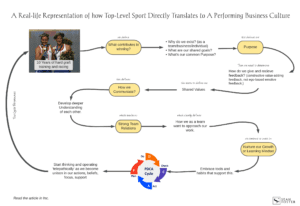Time to reflect: both on the Olympics and your progress

In my last post, I introduced Cath Bishop to you. She has such a powerful message in terms of her journey to success, her time in the forces in the middle east and now her experiences as a business coach.
It is for this reason that I am offering a reminder, that in case you did not follow the link in my last NewsBrief, do it now. There are valuable learnings that could apply to you as well.
I have just about finished her audiobook, available on Audible, it gets a thumbs up from me. Title: The Long Win, The search for a better way to succeed.
Back to meercats.

A gang of meercats (yeah, they are called a gang) look out for each other and are hyper-alert to danger as they are just small creatures in the wild, where some seriously aggressive predators roam (ps. a little like some of us SMEs). When danger appears, they dart away and then from ‘relative’ safety you notice then stop, turn around, stand on their back legs and survey the territory.
Well, this is exactly where we are now. Midway through a 90-day planning cycle (now it’s Q2, Jul-Sept), we need to stop, reflect, and adjust.
A plan is merely an intent, and this is what 90-day planning is all about. The intent needs to be strong, in fact bulletproof, but the exact steps on how we deliver on the intent need to have wriggle room as the environment we operate in is dynamic.
Most 90-day plans fail because when they are created around task lists of things to do, instead of working on high-level priorities.
So, when we get to the mid-way point these tasks are either already completed or the priorities have changed. The message here: If you fail at the midpoint of your plan, it is with 99% likelihood that you have set it up incorrectly in the first place.
If this is you, then you still have time to adjust. I recommend that you apply the following to your plan.
1. Reset the target completion date if it has changed. Achieving the outcome is generally far more valuable than beating yourself up because the date for completion has become unrealistic
2. If a specific activity involves other team members and they have let you down, then act on this now. Understand why they have let you down: They don’t understand; they forgot; they did not know they had to, or maybe you need to read them the ‘riot act.’
3. Delete an activity if it is no longer relevant or value-adding. Reprioritize outcomes that are more ‘bigger picture’. There are different ways to get this right, you need to find a way of thinking that works for you on this. For example:
What is something that I should be working on now, but feel that I can put off because there are more urgent demands? This thing you put off is likely to be the thing that should be in your 90-day plan.
If you critically look at your ‘urgents’, ask yourself: “what is causing this urgency, that if I fixed this thing, it would prevent this more urgent matter even arising?’ This is similar to the 5-why’s exercise, you need to get to the root cause of problems and urgencies, and to work on that. Often this thing is a much bigger fix, hence the reason why we tend to band-aid it.
Why is this mid-term check even important?
I hope that your subconscious was asking this 😊.
As humans, we repeat behaviours that are rewarding. This fact is so commanding that we will even repeat short-term rewarding behaviours even if their long-term effect is detrimental – think of certain addictions here like gambling or smoking.
With 90-day planning, you need to become sufficiently good at them such that the reward from creating, actioning and reflecting on their success is sufficiently rewarding that you are compelled to repeat the behaviour.
Short answer: check in on your 90-day plan now as it is critical that it is successful. Set yourself up for success.
Having the discipline and motivation to create effective 90-day plans is not easy to do on your own. If you would like help with yours then consider joining BIG.













